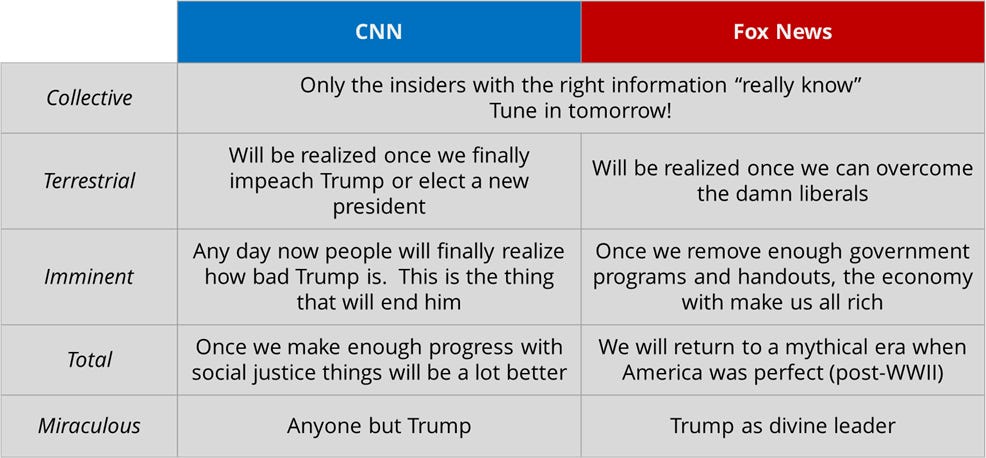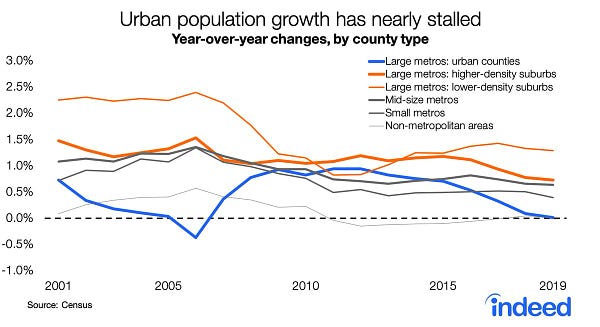April 18th: Greetings from Las Palmas. Here’s a pre-pandemic picture hiking the volcano area in Tenerife

💻 I set up some daily office hours to talk about anything work or personal, grab some time here
🙏 Huge thank you to John, Kyle and Josh for supporting this newsletter on Patreon. If you'd like to join them, click here.
👇 What follows is a short book review weaved in with some current thoughts. Would love to hear if you enjoy this kind of write-up!🌠 Utopias Everywhere
Millenarianism is is defined as “the belief by a religious, social, or political group or movement in a coming fundamental transformation of society, after which "all things will be changed".
I ran across this concept in a fascinating book by John Gray called “Black Mass” where he explored how humans have consistently been drawn toward millenarianist movements. He goes through the history and characteristics of these movements and also applies it to the then current movement to go to war against Iraq during the GW Bush presidency. He showed how their campaign and the associated propaganda embodied many of the traits of these kind of movements.
If you read the book, you can probably skim the parts about the early 2000s, but the broader perspective on these movements and how they continue to occur throughout history was eye opening. Once you become aware of these tendencies you see them everywhere.
Gray highlights many historical examples of religions, social movements and political regimes that embrace a certain way of thinking. Over the last ten years, it is easy to see how many of these same tendencies have become supercharged and A/B tested through social media.
Five Traits Of Milleniarism Movements
In the book Gray highlights Norman Cohn’s work to define these types of groups by five core traits:
collective, in that it is enjoyed by the community of the faithful
terrestrial, in that it is realized on earth rather than in heaven or in an after-life
imminent, in that it is bound to come soon and suddenly
total, in that it will not just improve life on earth but transform and perfect it
miraculous, in that its coming is achieved or assisted by divine agency
The combination of these five things results in movements that are willing to take drastic actions to achieve their aims, often resulting in violence that is regarded as a small price to pay for the imminent arrival of a new utopian order:
For Lenin and Trotsky, terror was a way of remaking society and shaping a new type of human being. The goal of the new Soviet regime was a world where humanity would flourish as never before. In order to achieve this end it was ready to sacrifice millions of human lives. The Bolsheviks believed the new world could come into being only after the destruction of the old.
This tendency is not limited to religions and political movements and Gray shows how this became embraced by the “cult of reason” during the enlightenment:
In secular thought, science has come to be viewed as a vehicle of revelation, a repository of truth rather than a system of symbols that serves the human need to understand and control.
This enabled many new “theories” which were justified by their sound reasoning:
These Enlightenment thinkers not only voiced the prejudices of their age – a failing for which they might be forgiven were it not for the fact that they so often claimed to be much wiser than their contemporaries – they also claimed the authority of reason for them. Before the Enlightenment, racist attitudes rarely aspired to the dignity of theory.
Preferred Pandemic Utopias
In our current climate, we are seeing many proclamations by people that are sure that imminent change is underway and that their preferred utopian vision also happens to be showing itself as the way forward. Here are some samples from things I’ve read:
we can bring order to the kingdom and build an intentional society on the love already shining through the cracks of the world of separation
One world is now gone and a new one has yet to emerge; we are now at the beginning of the beginning.
it will force us to reconsider who we are and what we value, and, in the long run, it could help us rediscover the better version of ourselves.
they are sure to demand major changes in the health-care system and maybe also the government; and they’ll become newly conscious of interdependency and community
At least for the next 35 years, I think we can expect that public respect for expertise in public health and epidemics to be at least partially restored
Just as this disease has shattered lives, disrupted markets and exposed the competence (or lack thereof) of governments, it will lead to permanent shifts in political and economic power in ways that will become apparent only later.
it is worth discussing what we can already learn from the crisis at this point, in order to reshape our economies and societies, redesign our organizations, and improve the way we work, live, and love
(and this was from only 5 minutes of searching)
I am not immune to this nor are you. If you don’t have at least one or two utopian visions, you are giving defaulting to someone else’s utopia. If you find yourself nodding in violent agreement with cable news, your utopia is also their business model. Consider this rough comparison of the CNN and Fox News camps in the US and how it fits with Cohn’s framework above.

No matter your utopia, it is better to be aware that you have one and also realize that if all your friends share the same utopia, you are probably at danger of becoming a true believer.
I see many self-employed, gig workers and future of work types fall into this trap. We see millions of people get laid off and the big corporations take another round of bailouts and we are sure, this time everyone will finally see how messed up everything is for how work and income is distributed!
These beliefs used to fuel me as I did organizational change consulting: once people wake up to how bad things are in modern organizations, surely things will have to change!
After reading Black Mass, I’m not so sure.
Gray notes how crisis tends to excite blind faith and how that same blind faith is often the thing that leads the vision into trouble.
The heady certainty of faith, which sees every crisis as a heaven-sent opportunity to save humanity, is ill-suited to dealing with dangers that can never be defused.
The leaders of these movements often have the combination of absolute certainty and the sense that “the time is now and this time is different”
The sense of having a part in such a narrative is delusive, of course. John of Leyden believed God had called him to rule over the New Jerusalem. Lenin was sure he was expediting the laws of history. Hitler was certain the corrupt world of liberal democracy was doomed. True believers in the free market interpreted the collapse of communism as a sign of an inexorable trend, and neo-conservatives greeted the few years of American supremacy that seemed to follow as a new epoch in history. All of these prophets imagined they had grasped the plot of history and were completing a preordained pattern.
Utopians Are Unfalsifiable
The gold standards of scientific research are hypothesis that can be falsified. This is that they can be tested and proved to be false.
Utopia are un-falsifiable. They are stories that cannot be disproven no matter how hard you try.
the utopian mentality is not nurtured on falsifiable social theories. It feeds on myths, which cannot be refuted. For Lenin and Trotsky, terror was a way of remaking society and shaping a new type of human being. The goal of the new Soviet regime was a world where humanity would flourish as never before. In order to achieve this end it was ready to sacrifice millions of human lives.
Gray notes that the problem with utopian thinking is that the power regimes that bring it about cannot ever realize the utopia they claim to support because if it were realized it would undermine everything the group stood for.
Leon Festinger wrote a book in the 1950s called When Prophecies Fail which looks at what happened when predictions of Doomsday cults failed to come true:
What Festinger failed to understand is that prophecies, per se, almost never fail. They are instead component parts of a complex and interwoven belief system which tends to be very resilient to challenge from outsiders. While the rest of us might focus on the accuracy of an isolated claim as a test of a group’s legitimacy, those who are part of that group—and already accept its whole theology—may not be troubled by what seems to them like a minor mismatch. A few people might abandon the group, typically the newest or least-committed adherents, but the vast majority experience little cognitive dissonance and so make only minor adjustments to their beliefs. They carry on, often feeling more spiritually enriched as a result.
So beware. If you are certain the world will almost certainly change amidst this crisis, be aware that you will probably only look for evidence that it is changing in the direction you desire. You will look for a leader that agrees with you. Perhaps that person is already on the following list: Andrew Cuomo, Donald Trump, Scott Adams, Tsai Ing-wen, Balaji Srinivasan, Zeynep Tufekci or Charles Eisenstein.
Is there a way out?
Gray notes that the impulse towards utopian visions is stronger in the western world where a judeo-christian view of the world sees the individual as someone that is living life out as a story and offers Eastern perspectives that see life as circular and repeating as a potential antidote:
Seeing one’s life as an episode in a universal narrative is a fantasy, and while it is supported by powerful western traditions it has not always been regarded as a good thing. Many of the world’s mystics have aimed to achieve a state of contemplation in which the succession of happenings from which we construct the story of our lives is absent. Plato and his disciples prized an eventless eternity over any process of change, and here they were close to Hindu and Buddhist thinkers. In a different tradition, Taoists taught that freedom lies in freeing oneself from personal narratives by identifying with cosmic processes of death and renewal.
#2 Indie Perspectives
I’m putting together a short deck for the business world bringing together ideas from independent consultants with Venkatesh Rao’s Art of Gig community (probably the best writing on being an indie consultant).
If you’d like to contribute, just hit reply ☝.
#3 From Twitter World
Urban population growth has slowed. It will be interesting to see what happens to cities like NYC after this crisis.


Alex Hillman has compiled some good resources on resources for self-employed workers and the stimulus program:


Bold predictions from a Venture Capitalist. I wonder how he’s factoring this into how he manages the employees at his current firm:

#4 How are you doing?
How are you holding up? What are you reading? What are you struggling with? Share some thoughts in the comments 💬
If you made it this far, want to share the post?

Want to Become A Micro-Supporter Of This Newsletter?
👉 If you'd like to become a recurring patron for $1 a month or more, you can join 23+ others Patreon or find other options here
💡 My self-paced course, Reinvent, is now available
💬 Comments are enabled for everyone. Leave your thoughts below 👇If you want to learn more about who I am or what I’m working on, find me here, say hi on twitter, or check out some of my longform writing.
If you aren’t subscribed to the e-mail, join us here:




Hey Paul.
Here in South Africa, we're in the midst of a 35-day nationwide lockdown. It's been particularly conducive to my research practice of picking a new topic every month, looking at it from as many angles as possible (books, blogs, podcasts, articles, interviews, etc), finding original ideas or ways to summarize, then sharing on my blog. Past topics include relationships, finding your calling, gift-giving, fasting, and being open-minded.
I say this all to ask: What topic would you focus on for a month?
Que disfrutes,
Chris